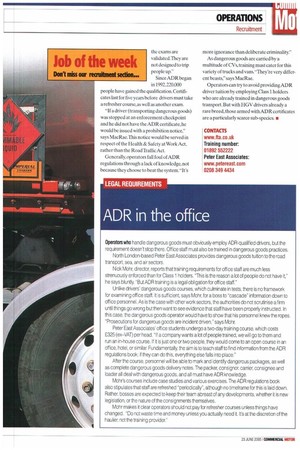ADR in the office
Page 67

If you've noticed an error in this article please click here to report it so we can fix it.
Operators who handle dangerous goods must obviously employ ADR-qualif ied drivers, but the requirement doesn't stop there. Off ice staff must also be trained in dangerous goods practices.
North London-based Peter East Associates provides dangerous goods tuition to the road transport, sea, and air sectors.
Nick Mohr, director, reports that training requirements for office staff are much less strenuously enforced than for Class 1 holders. "This is the reason a lot of people do not have it," he says bluntly "But ADR training is a legal obligation for office staff."
Unlike drivers' dangerous goods courses, which culminate in tests, there is no framework for examining office staff. It is sufficient, says Mohr, for a boss to "cascade" information down to office personnel. As is the case with other work sectors, the authorities do not scrutinise a firm until things go wrong but then want to see evidence that staff have been properly instructed. In this case, the dangerous goods operator would have to show that his personnel knew the ropes. "Prosecutions for dangerous goods are incident driven," says Mohr.
Peter East Associates' office students undergo a two-day training course, which costs £325 (ex—VAT) per head. "If a company wants a lot of people trained, we will go to them and run an in-house course. If it is just one or two people, they would come to an open course in an office, hotel, or similar. Fundamentally, the aim is to teach staff to find information from the ADR regulations book; if they can do this, everything else falls into place."
After the course, personnel will be able to mark and identify dangerous packages, as well as complete dangerous goods delivery notes. The packer, consignor, carrier, consignee and loader all deal with dangerous goods, and all must have ADR knowledge.
Mohr's courses include case studies and various exercises. The ADR regulations book also stipulates that staff are refreshed "periodically", although no timeframe for this is laid down. Rather, bosses are expected to keep their team abreast of any developments, whether it is new legislation, or the nature of the consignments themselves.
Mohr makes it clear operators should not pay for refresher courses unless things have changed. "Do not waste time and money unless you actually need it. It's at the discretion of the haulier, not the training provider."












































































































































































































